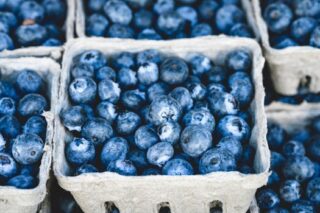
More Weight Control, Nutrition & Exercise Articles
Are Your Blueberries Spoiled? Learn the Signs of Freshness

Blueberries are a delightfully sweet and nutritious fruit enjoyed by many. However, like all fresh produce, they can spoil over time. Knowing how to tell if blueberries are bad is essential to ensure you’re consuming fresh, healthy fruit. Sometimes, spoiled blueberries can be spotted easily, but there are subtle signs to watch for as well.
How to Tell If Blueberries Are Bad
First and foremost, examine the appearance of your blueberries. Fresh blueberries should be a deep blue color with a silver, frosty coating known as “bloom.” This natural waxy coat protects the fruit and indicates freshness. If the bloom appears dull or absent, it may be an early sign the fruit is aging.
Another key indicator is the texture. Fresh blueberries are firm to the touch. If you find they’re soft, mushy, or shriveled, they are likely not suitable for consumption. Additionally, check blueberries for mold growth. Mold often appears as a fuzzy white or green surface covering and is a definitive sign that the fruit has spoiled.
Odor also plays a crucial role in detecting spoilage. Fresh blueberries have a mildly sweet aroma, while spoiled ones develop a sour or fermented smell. Trust your senses — if they smell off, it’s best to discard them.
Storing Blueberries Properly
Proper storage can significantly extend the lifespan of your blueberries. When storing in the refrigerator, keep them in their original packaging or a shallow container lined with paper towels to maintain air circulation. It’s important not to wash blueberries until you’re ready to eat them, as excess moisture can accelerate spoilage.
If you’re dealing with a larger quantity and need long-term storage, freezing is an effective option. Spread them in a single layer on a baking sheet, freeze until solid, then transfer to a sealed plastic bag. This prevents clumping and preserves them for months.
Health Benefits of Fresh Blueberries
Consuming fresh blueberries is not only a delight for the palate but also provides numerous health benefits. They are low in calories yet high in essential nutrients such as vitamin C, vitamin K, and manganese. Blueberries are also rich in antioxidants, particularly anthocyanins, which may support heart health and brain function.
Incorporating them into a balanced diet can contribute to overall well-being. For more comprehensive information about nutrition and weight loss, check out our article on safe and effective approaches to weight loss and hidden causes.
What to Do With Slightly Overripe Blueberries
If you find that your blueberries are just slightly overripe but not moldy or spoiled, you can still make use of them. Slightly soft blueberries can be excellent in smoothies, baked goods, or as a topping for yogurt or oatmeal. Their enhanced sweetness makes them perfect for recipes requiring less added sugar.
Creative Uses for Blueberries
Blueberries are versatile and can be enjoyed in a variety of ways. Consider adding them to cereals, salads, or beverages for an antioxidant boost. They also pair well with both sweet and savory dishes, highlighting their adaptability in the culinary world.
Exploring different blueberry recipes can keep your meals interesting and nutritious, while ensuring no blueberry goes to waste. Keep recipes in line with seasonal produce for the freshest flavors and nutritional benefits.
Conclusion
Learning how to tell if blueberries are bad is vital for both safety and enjoyability. Elaborate care in storage and preparation can ensure you savor every delicious bite of this beloved berry, whether fresh, in recipes, or preserved for later use. Remember, always rely on your senses to judge their condition, and be sure to enjoy these little wonders in your daily diet.
- Fresh blueberries are firm, deeply colored, and bloom-covered.
- Spoiled blueberries may be soft, discolored, or moldy.
- Proper storage extends freshness; refrigerate unwashed & freeze for long term.
- Consuming blueberries offers nutritional benefits including antioxidants.
- Overripe berries can still be useful in various recipes.
Frequently Asked Questions
Are blueberries still good if they are wrinkled?
Blueberries that are wrinkled are not as fresh but may still be usable in cooked or baked recipes if they are not moldy or spoiled.
Can I eat blueberries past the expiration date?
The expiration date is a guideline. Inspect them for signs of spoilage: check for mold, unusual odors, or a slimy texture.
Is it safe to eat blueberries with a white film?
Yes, the white film is called bloom and it is a natural coating that protects the fruit. It indicates freshness and is entirely safe to eat.
What happens if I accidentally eat moldy blueberries?
Consuming moldy blueberries may upset your stomach. It’s best to discard any visibly moldy berries to avoid potential discomfort.
How should I thaw frozen blueberries?
Thaw frozen blueberries in the refrigerator or use them directly in recipes that require cooking, such as muffins or pancakes.
For additional resources on the nutritional benefits of blueberries, refer to the health section on Wikipedia for broad health information. Always remember to prioritize safety and enjoyment when integrating blueberries into your meals.
Other Articles You May Find of Interest...
- The Surprising Benefits of Protein in Cheddar Cheese
- Discover the Amazing Benefits of Eating Brazil Nuts for Your Health and Hair Growth
- Is Allulose Safe and What Are Its Side Effects and Ingredients?
- Transform Your Shape with These Effective Glute Exercises
- Discovering the Highest Protein Milk Options for Your Health
- Delicious High Fiber High Protein Meal Ideas for a Healthier You
- Achieve Your Weight Loss Goals: Discover the Timeline to Lose 40 Pounds














